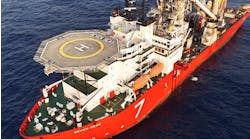New analysis: potential lapse in leasing program threatens American energy security
Offshore staff
WASHINGTON, DC – The American Petroleum Institute (API) and the National Ocean Industries Association (NOIA) have released new analysis outlining the potential economic consequences of delaying the Department of the Interior’s (DOI) 5-year program for leasing in the Gulf of Mexico.
The next five-year offshore leasing program must be in place by July 1, 2022, but is well behind schedule, and no offshore lease sales can be held unless DOI implements a new program.
The report, “The Economic Impacts of a 5-Year Leasing Program Delay for the Gulf of Mexico Oil and Natural Gas Industry,” was prepared by Energy and Industrial Advisory Partners (EIAP). It warns how a delay in the program could jeopardize American energy security and cost thousands of US jobs and billions in government revenue.
API Senior Vice President of Policy, Economics and Regulatory Affairs Frank Macchiarola said: “Now more than ever, US oil and natural gas development is critical for the nation’s long-term energy security and our national security, and offshore production plays a key role. Policymakers should be doing everything they can to encourage the development of our nation’s vast energy resources and acting on the five-year program is a commonsense step the administration could take right now to support global energy security now and in the future.”
NOIA President Erik Milito said: “At a time of geopolitical uncertainty and rapidly rising energy prices, Gulf of Mexico oil and gas production is more important than ever. Promoting opportunities for increased US oil and gas production will help fortify our national security, alleviate inflationary energy prices, reduce our dependence on foreign sources of energy, and secure our energy from highly regulated and lower emissions production sources here at home. The longer we go without being able to explore and develop new leases offshore, the longer we weaken a key, proven national strategic energy asset in the US Gulf of Mexico.”
Greater Lafourche Port Commission Executive Director Chett Chiasson said: “Offshore energy is the primary economic generator for the Lafourche Parish community, supporting not just jobs, but also substantially funding the government services provided by the Parish, like after school programs, economic development assistance, public works and emergency preparedness. Offshore activity serves as an economic base for our levee and water districts as well. In our daily lives, where we live, work, raise families, go to school, recreate – offshore energy production is vital to all of it, and that is the case in any community across the country that supports energy activity.”
The EIAP report noted that since 1980, DOI has been required to prepare a five-year offshore leasing program to best meet national energy needs for the five-year period, including a schedule of oil and gas lease sales and details on the size, timing and location of proposed leasing activity. Despite their legal obligation to maintain an offshore leasing program, DOI is well-behind schedule in this multi-year regulatory process and has yet to initiate the third comment period required for completion, the report said.
The report also noted the following projections:
* With a five-year offshore leasing program, the Gulf of Mexico is projected to produce an average of 2.6 million barrels per day of oil and natural gas from 2022–2040. A delay in the program could mean nearly 500,000 barrels per day less over that time period.
* In 2036, the lost Gulf of Mexico production could mean 885,000 fewer barrels of oil and natural gas per day – a 33% decrease from where we’d be with a 5-year offshore leasing program in place.
* 370,000 American jobs are supported by Gulf of Mexico offshore production. Nearly 60,000 of those could be lost without a five-year offshore leasing program.
* On average, $1.5 billion per year in government revenue could be lost with reduced offshore production.
The Consumer Energy Alliance (CEA) also issued a statement on the potential delay of the five-year leasing plan. CEA President David Holt said: “We need more offshore production as quickly as possible to improve US energy security, protect families, lower prices, help curtail inflation, fight back against Putin, and put America back on a sound energy footing. We can continue to diversify our energy portfolio and lower emissions at the same time, which America has already shown it can do without risking high energy prices or increasing emissions.”
03/29/2022



